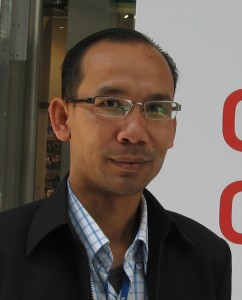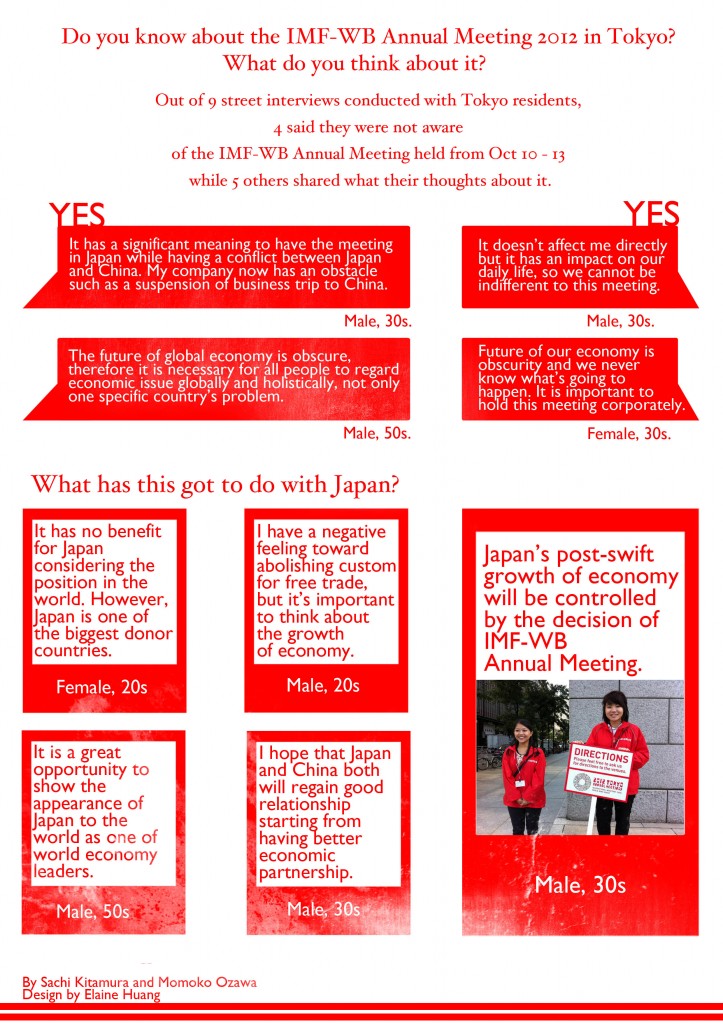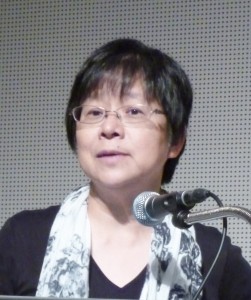Archive | News

Next Development Mantra: ‘Inclusive Growth’
Posted on 13 October 2012 by json
By Zofeen Ebrahim
TOKYO, Oct 13 (TerraViva) – World Bank president Jim Yong Kim first used the phrase, and then the International Monetary Fund’s Christine Lagarde followed. Or was it the other way round? Whatever the case, ‘inclusive growth’ will be the new development mantra, adding to the already jargon-infested discourse of the world of the United Nations and non-governmental organisations. Continue Reading

Activists Create Space at Meetings
Posted on 13 October 2012 by json
TOKYO, Oct 13 (TerraViva) – Whether it is finding a venue to push their causes, debating with others or catching up with trends in the work of the IMF and WB, various activists say they have found the Annual Meetings useful. Continue Reading

Tags: aid, Cambodia, poverty, youth
Q & A: Poverty Limits Youth Capacity
Posted on 12 October 2012 by json
Mak Chamroeun, president of Khmer Youth Association, is the lone activist from Cambodia at the IMF-WB Annual Meetings in Tokyo, Japan. He chats with IPS Asia-Pacific TerraViva’s Sam Rith about what he learned from the meetings.
TerraViva: What have you learned from these meetings?
Mak: What I learned most relates to the youth, the shortage jobs for youth that the leaders of IMF and World Bank are very interested in. I found that there are a lot of joblessness among the youth, and that there will be more cooperation to resolve the economic crisis, youth issues, and joblessness. I have listened to different guest speakers in different seminars during the IMF-World Bank meetings talk about how to resolve the joblessness of the youth. They said that SMEs play very important role (in this). I found out that the leaders of IMF and World Bank showed high commitment not (only to) reduce the poverty, but to end poverty.
TerraViva: What are the challenges that Cambodian youth face today?
Mak: Cambodian youth now are facing illiteracy, lack of education, lack of skills that the market requires. Not many of our youths now participate in implementing political, democracy, human rights and local governance. We have about 8 million youths, about 60 to 65 percent of the population. We do not have parliamentarians aged below 35. Each year, thousands of students graduate from schools and colleges but there is no working opportunity in their local areas. The other issue is that the poverty limits them from being able to get education, health treatment and other services. Drugs are still a problem.
TerraViva: Cambodia has been receiving a lot of aid from developed countries, World Bank, IMF and others after the civil war. How important will aid continue to be for the country?
Mak: We still need aid from outside because the government has not yet managed effectively to raise internal resources including natural resources, human resources and others.

Tags: japan, official development assistance, quake, tsunami, WB-IMF meetings
Japan’s Crisis May Yet Be A Wake-up Call
Posted on 12 October 2012 by json
By Suvendrini Kakuchi
TOKYO, Oct 13 (TerraViva) – Forty-eight years ago in September 1964, Japan hosted the International Monetary Fund-World Bank annual meetings as a borrower. This week, the gleaming Japanese capital hosted the same meetings as a top international lender and the world’s third largest economy.
The story of Japan’s change from aid recipient to top donor has been a recurring backdrop at the meetings here, but analysts warn that this revolutionary transformation gives no reason for smug celebration.
Instead, they say, the deeper mood in Tokyo as it basks in the international limelight is one of restless foreboding coupled with a yearning for reforms of the very same institutions that nurtured it when it was a post-war economy on recovery.
“Japan faces tough challenges today even though the country has come a long way from the ashes of the war when it was defeated in 1945,” said Dr Takehiko Ohta, an expert on land conservation policy who taught at the prestigious University of Tokyo.
“I would describe the national mood as somber as we embark on the transition road to find apt and long-term solutions to our pressing problems,” said Ohta.
Indeed, emerging alongside the major advances that Japan has made are those \that threaten its much-admired achievements.
A stubborn three decade-long economic recession has seen growth rates fall to an average of 2 percent annually, a trend that has forced the government to cut back on its much-touted overseas development assistance (ODA) budget. It now ranks fifth among international donor countries, and its ODA has been decreasing by more than 7 percent annually.
Its rapidly ageing population – Japan has the fastest ageing people in the world and some 20 percent of citizens are over 60 years old – is also something the country needs to find urgent solutions to, apart from wasteful public infrastructure projects and public debt that is ballooning as the government scrambles to support growing health and pension budgets.
 Unemployment – almost 10 percent among the younger generation – is also hurting public confidence given the fact 16 percent of Japan’s 127 million people is now on welfare assistance.
Unemployment – almost 10 percent among the younger generation – is also hurting public confidence given the fact 16 percent of Japan’s 127 million people is now on welfare assistance.
Job opportunities for young people have become harder to find because companies are restricting hiring as they face competition from industrialising Asian neighbours that are now entering the global market.
“Japan faces one of its worst postwar crises…. While the Great East Japan earthquake did immense damage to the country, it is undeniable that the self-conceit the nation developed during the period of high economic growth is partly to blame,” wrote the ‘Nikkei’, a leading Japanese financial daily, in its special on Japan-World Bank relations.
Nikkei advocates that policymaking in Japan undergo oversight from third parties, pointing out that “government agencies are not always best at making plans”.
While analysts view the Mar. 11, 2011 triple disaster of the Great Eastern Earthquake, tsunami and Fukushima nuclear accident as a huge blow to Japan, there is also growing consensus that this crisis could become the long-awaited catalyst to usher in important reforms.
“The disaster has shaken the very foundations of Japan by revealing cracks in a system that was admired before. But the sobering evidence has brought important reform, some of them unthinkable in Japan,” observed Ohta.
Ohta is now working on a coastal reforestation project in the tsunami- devastated north-east, led by a trilateral partnership among the local Nattori city, the civil society organization Oisca, and Wal-Mart Japan, which provides most of the funds.
“Such collaboration and new partnerships would have been unthinkable a few decades ago,” he explained.
For Japan’s Finance Minister Koriki Jojima, finding solutions means extending political support to weakened sectors of agriculture and medicine, which fell behind during the growth times that focused, among others, on developing the country’s much-vaunted automobile technology.
“Subsidies aimed for job security now focuses on training youth,” he said, explaining the necessity for the younger generation to survive in a tougher and meaner global system. This situation is a far cry from that of their parents, who worked during the high-growth years.
The Fukushima nuclear accident has indeed encouraged positive changes in Japan, according to Yurika Ayukawa, an expert on clean energy. She points to growing public opposition to nuclear power, which she says is “a major feat in a country that had traditionally accepted government slogans that justified large investments to build nuclear reactors on the basis of supporting economic development.”
“When considering the support for change among average Japanese, there is no turning back,” insists Ayukawa. “This is the symbol of real change.” (END)

Tags: employment, jobs, youths
Training, English and ICTs: Job-Hunting Tools
Posted on 12 October 2012 by elainehuang
By Sam Rith
TOKYO, Oct 13 (TerraViva) – Vocational training, knowledge of international languages like English and information and communication technologies (ICTs) are the major factors that young people need to get jobs, development experts here said. Continue Reading

MYANMAR: Easy Does It, Foreign Donors Told
Posted on 12 October 2012 by json
MYANMAR: Easy Does It, Foreign Donors Told
By Johanna Son
TOKYO, Oct 12 (TerraViva) – Foreign donors are rushing into Burma, whose government has been pushing the right political buttons as part of its democratic reform process. But development planners and Burmese activists here caution that the best approach should still be ‘easy does it’. Continue Reading

Cash for Food
Posted on 12 October 2012 by json
The international community has responded to the food price inflation – which has hit the world because of global warming-induced drought – by pledging money to help the most affected poor countries tide over the crisis. Continue Reading

Tags: global, health, IMF, World Bank
It Pays To Invest In Health
Posted on 12 October 2012 by elainehuang
By Zofeen Ebrahim
TOKYO, Oct 12 (TerraViva) – Universal access to healthcare must change from just a slogan to a reality, say civil society groups here that are calling on the World Bank to push this higher up on the political agenda. Continue Reading

Tags: agriculture, ASEAN, JICA, rice
Rapid Dev’t Eating Up Food Security
Posted on 12 October 2012 by json
By Sam Rith
TOKYO, Oct 12 (TerraViva) – Call it a flipside of South-east Asia’s robust economic growth: Its economies are churning out healthy growth rates, but this rapid development is also eating into its food security. Continue Reading
With the Support of:

-
CATEGORIES
- Dateline Earth (4)
- Featured (4)
- Interviews (4)
- News (14)
- Reporters' Notebook (10)
- Scenes (2)
- Views (1)
-
ARCHIVES
- October 2012 (34)









